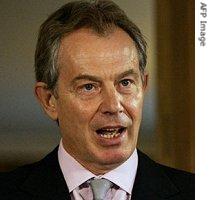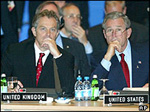2007年VOA标准英语-Assessing Tony Blair's 10 Years in Office
搜索关注在线英语听力室公众号:tingroom,领取免费英语资料大礼包。
(单词翻译)
By Mandy ClarkLondon
30 April 2007
Prime Minister Tony Blair took office 10 years ago, and as leader of Britain's Labour Party fashioned a political marriage with America's top Democrat1, U.S. President Bill Clinton. But when a less ideologically2 compatible Republican assumed the American presidency3 in 2001, Mr. Blair did not spurn4 his special relationship with the White House. He found common ground on a number of issues, notably5 Iraq, with the more conservative George W. Bush. From London, Mandy Clark looks back at Tony Blair's decade in office.
 |
| Tony Blair (photo: November 2006 |
The Iraq war... and London bombings -- some of the iconic moments in Prime Minister Tony Blair's 10 years in office.
When he swept to power in 1997, the 43-year-old family man ditched the stuffy6 image of British reserve.
His style was 'call me Tony', and his new Labour Party -- dynamic, modern and efficient with a new approach on the economy, social issues and foreign policy.
But just months into office, came Tony Blair's first political crisis -- the death of Diana, Princess of Wales and the decidedly silent royal family. It was left to him to articulate the country's mood.
"We are today a nation, in Britain, in a state of shock, in mourning, in grief that is so deeply painful to us," he said at the time.
His first big success came in 1998 with the Good Friday Agreement -- bringing together the warring parties of Northern Ireland. "I think and I hope there is plenty of goodwill7 there,” he said, “provided we can agree on the principles and express them clearly."
It helped to create the conditions for peace that have since transformed the province.
But it was Kosovo's humanitarian8 crisis in 1999 that launched Mr. Blair as a powerful player on the world stage.
Comparing Slobodan Milosevic's attempt at ethnic9 cleansing10 to Nazism11, he became a persuasive12 voice, demanding the defeat of the Serbian leader.
The 2001 election was a mere13 formality as Mr. Blair won a second term in a landslide14. But the love affair with the electorate15 deteriorated16.
Kevin Maguire is associate political editor of the left-leaning Daily Mirror. He says that change was hard to avoid. "Ten years ago he talked about a new dawn over Britain and he could have walked on water, he could have done anything he wanted."
 |
| Prime Minister Blair and President Bush |
"The full horror of what has happened in the United States earlier today is now becoming clearer. It is hard even to contemplate17 the utter carnage and terror which has engulfed18 so many innocent people.
Shoulder to shoulder with President Bush, Mr. Blair formed a coalition19 to confront al-Qaida in Afghanistan. But his next move split both his party and the country. "Now is not the time to falter,” he said.
In 2003, there was strong public opposition20 to the looming21 Iraq war. Although he won the grudging22 support of politicians, the public -- and the press -- were far from convinced.
He was vilified23 as an American yes-man, and pop culture portrayed24 him as Washington's pet poodle. Mr. Blair's popularity deteriorated further as the war dragged on and weapons of mass destruction were never found.
George Jones is the political editor for the conservative Daily Telegraph. "Iraq will undoubtedly25 be the moment he began to lose public support, public trust. If it had not been for Iraq, there is no doubt that Tony Blair would go down as one of the most successful prime ministers."
In 2005, he won his third term but his party took a pounding at the polls. Then in July came the terrorist attacks on London, amid claims that UK foreign policy had inspired the British bombers26.
By 2006, talk of life after Tony -- once unthinkable -- became all-consuming. He told the public he was leaving, but he refused to set a date for his departure. A backstage power struggle ensued between him and his Chancellor27 Gordon Brown.
"It is hard to let go. But it is also right to let go -- for the country and for you, the party,” said the prime minister.
Britons are divided on how he has served them. "He had a lot of good intentions but his major mistake was supporting the war," said one man in London. Another said, "I guess he has done the country proud, but time for someone new? Definitely."
How history ultimately will remember Tony Blair is anyone's guess, but for now his legacy28 remains29 shrouded30 in the long shadows of the Iraq war.
 收听单词发音
收听单词发音 




